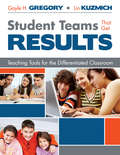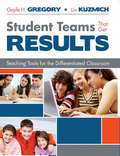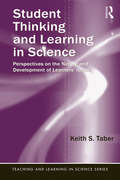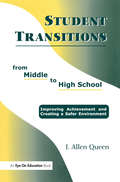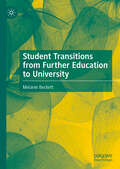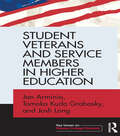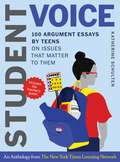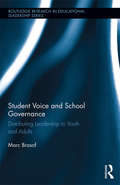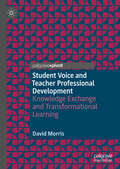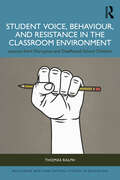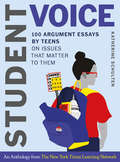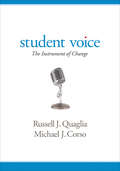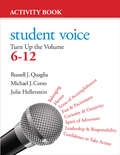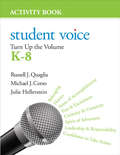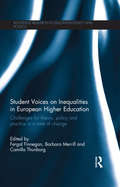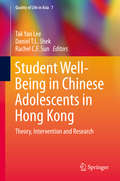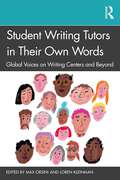- Table View
- List View
Student Teams That Get Results: Teaching Tools for the Differentiated Classroom
by Gayle H. Gregory Linda M. KuzmichIntegrating effective grouping strategies with research-based practices, this resource provides more than tools that help diverse students work cooperatively and learn together in differentiated classrooms.
Student Teams That Get Results: Teaching Tools for the Differentiated Classroom
by Gayle H. Gregory Lin KuzmichThis resource shows how students who work together and share ideas with one another can deepen their understanding of essential concepts. Combining effective grouping strategies with other research-based practices, this resource focuses on the power of student collaboration and dialogue in differentiated classrooms. Students can strengthen critical thinking and achievement through three key skills: teaming to learn, sharing knowledge and skills, and integrating and applying learning. The authors offer more than 100 reproducible planning tools to help learners: * Improve critical thinking * Generalize and infer * Integrate content and Identify patterns * Increase adaptive and analytical reasoning By utilizing these innovative teaching tools and strategies with their student teams, teachers can prepare all students for deeper thinking and success--both in the classroom and on assessments!
Student Test Preparation Booklet LEVEL M (Fountas & Pinnell LLI Red #Level M)
by Leveled Literacy Intervention RED SystemStudent Test Preparation Booklet LEVEL M LESSONS 61-64
Student Test Preparation Booklet Level N (Fountas & Pinnell LLI Red #Level N)
by Leveled Literacy Intervention RED SystemStudent Test Preparation Booklet LEVEL N LESSONS 93-96
Student Test Preparation Booklet Level O (Fountas & Pinnell LLI Red #Level O)
by Leveled Literacy Intervention RED SystemStudent Test Preparation Booklet LEVEL O LESSONS 125-128
Student Test Preparation Booklet Level P (Fountas & Pinnell LLI Red #Level P)
by Leveled Literacy Intervention RED SystemStudent Test Preparation Booklet LEVEL P LESSONS 157-160
Student Thinking and Learning in Science: Perspectives on the Nature and Development of Learners' Ideas (Teaching and Learning in Science Series)
by Keith S. TaberThis readable and informative survey of key ideas about students’ thinking in science builds a bridge between theory and practice by offering clear accounts from research, and showing how they relate to actual examples of students talking about widely taught science topics. Focused on secondary students and drawing on perspectives found in the international research literature, the goal is not to offer a comprehensive account of the vast literature, but rather to provide an overview of the current state of the field suitable for those who need an understanding of core thinking about learners’ ideas in science, including science education students in teacher preparation and higher degree programs, and classroom teachers, especially those working with middle school, high school, or college level students. Such understanding can inform and enrich science teaching in ways which are more satisfying for teachers, less confusing and frustrating for learners, and so ultimately can lead to both greater scientific literacy and more positive attitudes to science.
Student Transitions From Middle to High School
by J. Allen QueenThis book shows administrators and teachers what they can do to make their students' ninth grade experience a successful one. Practical and research-based, this book showcases strategies to help you reduce your dropout rate, enhance student achievement, and provide a safe environment for your ninth grade students.
Student Transitions from Further Education to University
by Melanie BeckettThis book presents the life stories and lived experiences of 12 individuals who transitioned from the sixth form of a further education college in a traditionally working-class area of the UK, to higher education. The author employs narrative inquiry in order to explore the participants’ unique perspectives. Theoretically, Bourdieu’s concepts of field and habitus are used to explain how these undergraduates adapted to their new circumstances, which in turn altered their ways of thinking and behaving. The book examines the impact of class on student transition, as well as offering insights into why further education warrants renewed focus, and concludes with a set of recommendations for both policy and practice.
Student Veterans and Service Members in Higher Education (Key Issues on Diverse College Students)
by Jan Arminio Tomoko Kudo Grabosky Josh LangStudent Veterans and Service Members in Higher Education bridges theory to practice in order to better prepare practitioners in their efforts to increase the success of veteran and military service members in higher education. Bringing together perspectives from a researcher, practitioner, and student veteran, this unique author team provides a comprehensive but manageable text reviewing relevant research literature and presenting accessible strategies for working with students. This book explores the facilitators and barriers of student veteran learning and engagement, how culture informs the current student veteran experience, and best practices for creating and maintaining a campus that allows for the success of these students. The latest to publish in the Key Issues on Diverse College Students series, this volume is a valuable resource for student affairs and higher education professionals to better serve veteran and military service members in higher education.
Student Voice Teacher's Special: From The New York Times Learning Network
by Katherine SchultenHelp your students craft convincing arguments with award-winning mentor texts written by teenagers and companion teaching guide. This bundle includes one copy each of Student Voice: 100 Argument Essays by Teens on Issues That Matter to Them and Raising Student Voice: 35 Ways to Help Students Write Better Argument Essays, from The New York Times Learning Network. At a time when examples of “student voice” are everywhere, from Greta Thunberg to the Parkland students to the teenagers in the streets of Hong Kong, the argument writing that students study in school is still almost entirely written by adults. It is a wholly different experience for teenagers to study the work of their peers. It’s relatable. It’s relevant. And it doesn’t feel like an untouchable ideal. In this new collection of 100 essays curated by The New York Times, students will find mentor texts written by their peers—13-18-year olds—on a wide range of topics including social media, race, school lockdown drills, immigration, tackle football, the #MeToo movement, and COVID-19. For any teacher who feels that students write better when they have some choice over the topic and form, when they write for an audience beyond the teacher and a purpose beyond a grade, and when they get to sound like themselves, this anthology is an invaluable resource to accompany any composition text. In the companion teacher’s guide, Katherine Schulten—a former teacher and writing coach herself—provides teachers with 35 strategies and classroom-ready activities for using these peer mentor texts with their students. Raising Student Voice also includes 500 writing prompts, a “topic generator” with questions to help students decide what they’d like to write about, and a sample essay annotated with the comments of Times judges.
Student Voice and School Governance: Distributing Leadership to Youth and Adults (Routledge Research in Educational Leadership)
by Marc BrasofWhile student voice has been well-defined in research, how to sustain youth-adult leadership work is less understood. Students are rarely invited to lead school reform efforts, and when they are, their voice is silenced by the structural arrangements and socio-cultural conditions found in schools. This volume investigates problems with the neoliberal school reform movement, and how youth-adult partnerships have resulted in more effective reforms within schools and community organizations nationally and internationally. Stemming from an eight-year ethnographic study at a civic-themed public high school, the volume highlights the process of creating a school governance structure which produces active and informed citizens. Made up of executive, legislative and judicial branches, the program gives students the power to make, implement and review school policies and practices—a model that has found to effectively distribute leadership and trigger organizational learning, and is thus at the forefront of civic education.
Student Voice and Teacher Professional Development: Knowledge Exchange and Transformational Learning
by David MorrisThis book explores the role of students’ involvement in teacher professional development. Building upon a research study whereby pupils instruct their teachers in the use of Information and Communication Technology (ICT), the author argues that using student voice in this way can result in transformational learning for all those involved. The author presents the processes and experiences of pupils taking on the role of educators as well as the experiences of the teachers receiving such professional development from their students. In doing so, he promotes the innovative use of a student voice initiative to support teaching and learning, with the overarching purpose of improving and transforming teacher-pupil relationships. This book will be of interest and value to students and scholars of pupil voice, teacher professional development and transformational learning.
Student Voice, Behaviour, and Resistance in the Classroom Environment: Lessons from Disruptive and Disaffected School Children (Routledge New and Critical Studies in Education)
by Thomas RalphThis novel volume investigates the motivations behind disruptive pupil behaviour and offers practical guidance through discussion of a novel theoretical framework that explores how students perceive schooling, uncovering what their behaviour can tell us about how to adjust the school environment. Drawing on cutting-edge research and internationally relevant themes, chapters argue that non-compliant behaviour by students is not mindlessly reactive but is purposeful – a means to make themselves heard. The book explores a dynamic understanding of the processes of placemaking and offers insights on how students create 'student-friendly' places by re-appropriating spaces within schools and why they might behave in certain ways. Arguing that the wider implications of a failure in educational policy is detrimental to student retainment and success, the book will ultimately have ramifications across disciplines and classroom contexts in improving student engagement. This book will be of interest to researchers, practitioners and policy makers working in the fields of the sociology of education, teaching and teacher education, educational change and reform more broadly. Those looking into behaviour management, youth studies, and education policy will also find this book of interest.
Student Voice: 100 Argument Essays By Teens On Issues That Matter To Them
by Katherine SchultenFinally, mentor texts written by teenagers, to help your students craft convincing arguments. In this new collection of 100 essays curated by The New York Times, students will find mentor texts written by their peers—13-to-18-year-olds—on a wide range of topics, including social media, race, video games, lockdown drills, immigration, tackle football, and the #MeToo movement. All of the essays were either winners or runners-up from The New York Times Learning Network 2014–2019 Student Editorial contests, in which students could take on any issue they liked and, in 450 words or fewer, persuade readers—including educators from around the country as well as Times judges—to adopt their point of view. The essays have been selected for their voice, style, and use of evidence, as well as to present snapshot of issues across a dozen categories that are of particular interest to adolescents. Student Voice is also available as a package with Raising Student Voice: 35 Ways to Help Students Write Better Argument Essays, from The New York Times Learning Network, a teacher's companion guide packed with practical advice from teachers, Times editors, and even student winners about how to use these essays in writing instruction.
Student Voice: The Instrument of Change
by Dr Russell J. Quaglia Dr Michael J. CorsoMeaningful school reform starts with your most powerful partner—your students! When you take time to listen, you’ll find that students’ aspirations can drive your school toward exciting new goals—and when students know they’re being heard, they engage meaningfully in their own academic success. Using examples drawn from student surveys, focus groups, observations, and interviews, this groundbreaking book presents a blueprint for a successful partnership between educators and students. You’ll discover how to: Ask the right questions—and understand how to build from the answers Engage students in decision-making and improvement-related processes Implement the Aspirations Framework to guide students toward their full potential
Student Voice: The Instrument of Change
by Dr Russell J. Quaglia Dr Michael J. CorsoMeaningful school reform starts with your most powerful partner—your students! When you take time to listen, you’ll find that students’ aspirations can drive your school toward exciting new goals—and when students know they’re being heard, they engage meaningfully in their own academic success. Using examples drawn from student surveys, focus groups, observations, and interviews, this groundbreaking book presents a blueprint for a successful partnership between educators and students. You’ll discover how to: Ask the right questions—and understand how to build from the answers Engage students in decision-making and improvement-related processes Implement the Aspirations Framework to guide students toward their full potential
Student Voice: Turn Up the Volume 6-12 Activity Book
by Russell J. Quaglia Michael J. Corso Julie A. HellersteinPromote student self worth and engagement with these one-of-a-kind activities! Help your students reach their fullest potential. Create unique learning experiences adaptable to their needs and aspirations with this extraordinary activity book from internationally acclaimed experts Dr. Russell Quaglia, Michael Corso and Julie Hellerstein. A companion piece to Quaglia’s K-8 guide, the authors implement 3 Guiding Principles and 8 Behaviors and Conditions that profoundly affect student success in grades 6 - 12. You’ll discover student-centric ideas and activities that powerfully engage 6th-12th grade students in important content areas. Timesaving and easy-to-implement activities help you to: Promote student self expression, values, hopes and dreams Foster student engagement, sense of purpose and self worth Provide a creative and challenging learning environment for all ability levels Align activities with Common Core and ISTE Standards (NETS) and 21st Century Skills Promote student leadership and responsibility Capitalize on technology and promote interdisciplinary connections Includes a handy correlation chart and group discussions, personal reflections, and extended learning opportunities for each stand-alone lesson. An inspiring resource for any educator, use these fun, extensively researched activities to help your students reach their full potential! The authors have once again designed an extraordinary roadmap for teachers to use in guiding students to find their true voice. A research-based roadmap yes, but more importantly, a map teachers can use to guide students to find their voice through their experiences. The wonderful activities herein are inspiring, engaging and interactive and ultimately lead students to discover their own unique voice and aspirations!" Rich McBride, Ed.D., Superintendent 2014 AESA National President
Student Voice: Turn Up the Volume 6-12 Activity Book
by Russell J. Quaglia Michael J. Corso Julie A. HellersteinPromote student self worth and engagement with these one-of-a-kind activities! Help your students reach their fullest potential. Create unique learning experiences adaptable to their needs and aspirations with this extraordinary activity book from internationally acclaimed experts Dr. Russell Quaglia, Michael Corso and Julie Hellerstein. A companion piece to Quaglia’s K-8 guide, the authors implement 3 Guiding Principles and 8 Behaviors and Conditions that profoundly affect student success in grades 6 - 12. You’ll discover student-centric ideas and activities that powerfully engage 6th-12th grade students in important content areas. Timesaving and easy-to-implement activities help you to: Promote student self expression, values, hopes and dreams Foster student engagement, sense of purpose and self worth Provide a creative and challenging learning environment for all ability levels Align activities with Common Core and ISTE Standards (NETS) and 21st Century Skills Promote student leadership and responsibility Capitalize on technology and promote interdisciplinary connections Includes a handy correlation chart and group discussions, personal reflections, and extended learning opportunities for each stand-alone lesson. An inspiring resource for any educator, use these fun, extensively researched activities to help your students reach their full potential! The authors have once again designed an extraordinary roadmap for teachers to use in guiding students to find their true voice. A research-based roadmap yes, but more importantly, a map teachers can use to guide students to find their voice through their experiences. The wonderful activities herein are inspiring, engaging and interactive and ultimately lead students to discover their own unique voice and aspirations!" Rich McBride, Ed.D., Superintendent 2014 AESA National President
Student Voice: Turn Up the Volume K-8 Activity Book
by Russell J. Quaglia Michael J. Corso Julie A. HellersteinInvolve and inspire students with these one-of-a-kind activities! Help your students reach their fullest potential. Create unique learning experiences adaptable to their needs and aspirations with this extraordinary activity book from internationally acclaimed education experts Dr. Russell Quaglia, Michael Corso and Julie Hellerstein. Based on hundreds of teacher and student interviews, the authors implement 3 Guiding Principles and 8 Behaviors and Conditions that profoundly affect student success in grades K-8. You’ll discover student centered ideas and activities that powerfully engage K-8 students in important content areas. Timesaving and easy-to-implement activities help you to: Promote student self expression, values, hopes and dreams Foster student engagement, purpose and self worth Provide a creative and challenging learning environment for all ability levels Align activities with Common Core, ISTE Standards (NETS) and 21st Century Skills Promote student leadership and responsibility Capitalize on technology and promote interdisciplinary connections Includes a handy correlation chart and group discussions, personal reflections, and extended learning opportunities for each stand-alone lesson. An inspiring resource for any educator, use these fun, extensively researched activities to help your students reach their full potential! "The authors have once again designed an extraordinary roadmap for teachers to use in guiding students to find their true voice. A research-based roadmap yes, but more importantly, a map teachers can use to guide students to find their voice through their experiences. The wonderful activities herein are inspiring, engaging and interactive and ultimately lead students to discover their own unique voice and aspirations!" Rich McBride, Ed.D., Superintendent 2014 AESA National President
Student Voice: Turn Up the Volume K-8 Activity Book
by Russell J. Quaglia Michael J. Corso Julie A. HellersteinInvolve and inspire students with these one-of-a-kind activities! Help your students reach their fullest potential. Create unique learning experiences adaptable to their needs and aspirations with this extraordinary activity book from internationally acclaimed education experts Dr. Russell Quaglia, Michael Corso and Julie Hellerstein. Based on hundreds of teacher and student interviews, the authors implement 3 Guiding Principles and 8 Behaviors and Conditions that profoundly affect student success in grades K-8. You’ll discover student centered ideas and activities that powerfully engage K-8 students in important content areas. Timesaving and easy-to-implement activities help you to: Promote student self expression, values, hopes and dreams Foster student engagement, purpose and self worth Provide a creative and challenging learning environment for all ability levels Align activities with Common Core, ISTE Standards (NETS) and 21st Century Skills Promote student leadership and responsibility Capitalize on technology and promote interdisciplinary connections Includes a handy correlation chart and group discussions, personal reflections, and extended learning opportunities for each stand-alone lesson. An inspiring resource for any educator, use these fun, extensively researched activities to help your students reach their full potential! "The authors have once again designed an extraordinary roadmap for teachers to use in guiding students to find their true voice. A research-based roadmap yes, but more importantly, a map teachers can use to guide students to find their voice through their experiences. The wonderful activities herein are inspiring, engaging and interactive and ultimately lead students to discover their own unique voice and aspirations!" Rich McBride, Ed.D., Superintendent 2014 AESA National President
Student Voices on Inequalities in European Higher Education: Challenges for theory, policy and practice in a time of change (Routledge Research in Education Policy and Politics)
by Fergal Finnegan Barbara Merrill Camilla ThunborgThis book focuses on the voices and experiences of non-traditional students in European higher education. It examines the impact that access to higher education is having on these students’ lives and discusses what this tells us about European education and society. In particular, it explores the multi-dimensional nature of inequality in varied national contexts focusing on the issues of class, gender, ethnicity, age and disability. The book contributes to the on-going debate about the changing nature of European higher education and argues that research based on the experiences of non-traditional students can be used to improve policy and practice in tertiary education. Drawing on biographical narrative interviews with ‘non-traditional’ students, the book covers topics including: • the contemporary nature of inequality and how the various forms of inequality intersect and overlap in higher education and society • the formation and transformation of learner identities • the structural barriers faced by non-traditional students • the sources of student resilience and agency • a comparison of patterns of inequality, access and retention in various European countries • the implications of these findings for practice and policies. Student Voices on Inequalities in Higher Education will appeal to academics, researchers, policy-makers and practitioners working in higher education institutions as well as people working in the field of widening participation, adult education, access and centres for teaching and learning. It will also be of interest to postgraduate students in higher education.
Student Well-Being in Chinese Adolescents in Hong Kong
by Rachel C. F. Sun Daniel T.L. SHEK Tak Yan LeeThis book reviews the theories regarding commonly occurring developmental issues among Chinese adolescents in Hong Kong, the application of Positive Youth Development (PYD) to a large-scale primary prevention program and the impact of PYD on student well-being, indexed according to adolescent developmental issue. Using multiple strategies, it presents the overall constructs and frameworks supporting P. A. T. H. S. in response to the various psychosocial needs of Hong Kong's youth. Some of the issues covered include substance abuse, sexual behavior, internet addiction, bullying and cyber-bullying. The book argues for the effectiveness of the school-based program in promoting student well-being in modern Hong Kong society and will be of interest to undergraduate and postgraduate students, university instructors, researchers, social workers, pediatricians, youth workers, educators, administrators, psychologists, school principals and allied professionals looking to promote whole-person development in junior form students and especially those with an interest in education in China.
Student Writing Tutors in Their Own Words: Global Voices on Writing Centers and Beyond
by Max OrsiniStudent Writing Tutors in Their Own Words collects personal narratives from writing tutors around the world, providing tutors, faculty, and writing center professionals with a diverse and experience-based understanding of the writing support process. Filling a major gap in the research on writing center theory, first-year writing pedagogy, and higher education academic support resources, this book provides narrative evidence of students' own experiences with learning assistance discourse communities. It features a variety of voices that address how academic support resources such as writing centers have served as the nucleus for students' (i.e., both tutors and their clients) sense of community and self, ultimately providing a space for freedom of discourse and expression. It includes narratives from writing tutors supporting students in unconventional spaces such as prisons, tutors offering support in war-torn countries, and students in international centers facing challenges of distance learning, access, and language barriers. The essays in this collection reveal pedagogical takeaways and insights about both student and tutor collaborative experiences in writing center spaces. These essays are a valuable resource for student writing tutors and anyone involved with them, including composition instructors and scholars, writing center professionals, and any faculty or administrators involved with academic support programs.
Student Writing Tutors in Their Own Words: Global Voices on Writing Centers and Beyond
by Max OrsiniStudent Writing Tutors in Their Own Words collects personal narratives from writing tutors around the world, providing tutors, faculty, and writing center professionals with a diverse and experience-based understanding of the writing support process.Filling a major gap in the research on writing center theory, first-year writing pedagogy, and higher education academic support resources, this book provides narrative evidence of students' own experiences with learning assistance discourse communities. It features a variety of voices that address how academic support resources such as writing centers have served as the nucleus for students' (i.e., both tutors and their clients) sense of community and self, ultimately providing a space for freedom of discourse and expression. It includes narratives from writing tutors supporting students in unconventional spaces such as prisons, tutors offering support in war-torn countries, and students in international centers facing challenges of distance learning, access, and language barriers. The essays in this collection reveal pedagogical takeaways and insights about both student and tutor collaborative experiences in writing center spaces.These essays are a valuable resource for student writing tutors and anyone involved with them, including composition instructors and scholars, writing center professionals, and any faculty or administrators involved with academic support programs.
